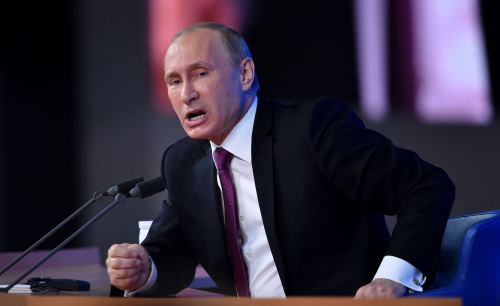 |
|
VOWING ACTION: Russian President Vladimir Putin speaks during his annual press conference in Moscow on December 18, 2014, promising to take strong measures to stabilize the ruble (XINHUA/AFP) |

Hit by both Western sanctions and a sharp drop of crude oil prices, Russia suffered a severe currency crisis at the end of 2014 with the ruble being traded at 80 per $1. The Russian economy grew at just 0.6 percent in the past year, and an estimated drop of 4 to 5 percent in 2015. Dragging the economy out of the doldrums is the biggest challenge facing Russian President Vladimir Putin, whose high approval ratings gained by "taking back" Crimea cannot last long under such conditions. Russia must find a way to salvage its economy.
Taking the initiative
To expand its economy, Russia has taken several steps to break the Western isolation that followed the Ukraine crisis.
First, Russia has enhanced its summit diplomacy, with Putin making stops to China, Turkey, Uzbekistan, India and Egypt in the past several months--all of which are its non-Western economic partners. During his visit to Turkey in early December 2014, Putin announced shelving the South Stream Offshore Pipeline project that would have provided gas to EU countries, while instead sought alternative routes to provide gas to Turkey. On December 10, Russia and Uzbekistan signed an agreement on strengthening economic cooperation for 2015-19. In India, Putin pledged to build at least 12 nuclear reactors by 2035. He also marketed Russian passenger planes to the heavily populated South Asian country. The Russian leader's visit to Egypt on February 10 was also fruitful, as the two countries agreed to establish a nuclear power plant in a coastal city in Egypt, an Egyptian-Russian free trade zone as well as a Russian industrial city near the Suez Canal corridor region.
Putin's marketing diplomacy has achieved remarkable success. For instance, Russia's Federal Agency on Atomic Energy gained 28 orders valued more than $100 billion. Russia is actively seeking economic cooperation with non-Western countries and to diversify its target markets in the face of crushing Western sanctions.
On the first day of 2015, a Russia-led trade bloc, the Eurasian Economic Union (EEU), came into being--a major step in the Russian effort to consolidate its backyard. Although Russia possesses advantages in the nuclear and defense industries, its other products are less competitive in the international market and are mainly exported to the Commonwealth of Independent States (CIS)--another important focus for its economic transition. Initiated by the leaders of Belarus, Kazakhstan and Russia on May 29, 2014, and following the example of the EU, the EEU is aimed at establishing an economic bloc for the free movement of goods, services, capital and labor by 2025. Armenia joined the group on January 2 and Kyrgyzstan is slated to become a full-fledged member on May 1. The establishment of the Russia-led group has further strengthened Moscow's ability to exert influence within the region.
Moscow has also sped up economic cooperation with China to forge a new strategic pivot for development. In the past year, Russia quickened its pace in developing Siberia and the Far East to take advantage of the fast economic expansion in the Asia-Pacific region. In May 2014, China and Russia inked a long-awaited gas deal worth $400 billion. In the meantime, oil producers and refineries from the two countries are working to create a China-Russia strategic energy alliance. In non-energy sectors, significant progress has been made between China and Russia in wide-body aircraft projects. The two countries signed a memo on high-speed train cooperation last year, planning to build a high-speed transportation corridor connecting Beijing and Moscow. It is widely believed that in the coming years, China will be the most important foreign investor to Russia as the latter seeks to become less dependent on the West.
Moreover, Russia is trying to break the current Russia-Europe confrontation caused by the Ukraine crisis. At the end of 2014, Russian Prime Minister Dmitry Medvedev said that the Western sanctions had resulted in a $40 billion-50 billion economic loss for Russia. The shattered investor confidence had led to serious capital outflow of as much as $151.5 billion. As a result, Russia needs to ease tension with the West to prevent its economy from collapsing. The United States and the EU are not a monolithic block, as many of the European countries have close economic links with Russia. Though Washington tries to contain Russia, Europe's energy reliance on Moscow will prevent a falling out. Most European countries including Germany and France are unwilling to engage in a military confrontation with Russia in which they could be at the frontlines. Therefore, with active mediation of German Chancellor Angela Merkel and French President Francois Hollande, Germany, France, Russia and Ukraine reached a new truce deal in the Belarusian capital Minsk in mid-February, partly easing tensions. In the future, Russia may continue to persuade Germany and France to exert their influence to lift EU sanctions. Russia would in return lift restrictions on importing agricultural products from the EU, thus easing its inflationary pressure caused by rising domestic food prices.
Seeking economic transition
On January 23, a high-ranking Russian official declared that the Russian Government has restarted an anti-crisis committee that first addressed the global financial crisis in 2008 to 2009. The committee includes officials from Russia's central bank and finance ministry, presidents of domestic and foreign trade banks, as well as parliament members. In the meantime, the Russian Government unveiled a plan to boost the country's stalled economy by cutting government spending and providing cash to the real economy, including investments totaling 1.4 trillion ruble ($20 billion) in infrastructure construction, industrial development, agriculture and innovation. The Russian Government is thereby turning a crisis into an opportunity to develop the country's non-resources sector.
In December 2014, Putin ratified a bill to establish Fast-Track Development Zones in the country's Far East region. According to the bill, enterprises in the Far East region can apply for exemption of federal profit tax for five years and a reduction of local tax. Russia is accumulating experiences to develop special economic zones that are suitable to its national conditions.
In addition, the poor investment environment of Russia has long been a point of criticism. Since 2012, the Russian Government has successively drawn 15 road maps to improve its investment environment. On January 30, Russia's Far East federal district government announced its Vladivostok city will adopt a special tariff policy, reduce port dues and cancel custom duties. In the future, the policy will be extended to the whole of the Primorsky territory.
During the Medvedev presidency, the Russian Government has already begun to explore ways to fulfill economic transition. Russia has successively proposed the concepts such as "innovative economy" and "new economy," and even attempted to build a Russian "silicon valley." However, Russia inherited a lot of problems from the Soviet Union--its companies are reluctant to make innovations as they can easily profit from resource exploitation. Thus, economic transition cannot be achieved in a short time.
In spite of being a leading energy producer, Russia lacks the power to determine world energy prices. Moreover, as the Ukraine crisis remains unpredictable, sanctions are likely to continue, forcing Russia to seek more ways to mend relations with the West.
The author is deputy director of the Department for European-Central Asian Studies under the China Institute of International Studies
